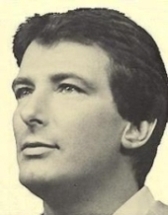|
When I file my past in the past instead of in the future, what's in the future then?
Nothing ... When I file my past in the past instead of in the future, what's in the future is nothing. When there's nothing in the future, I'm free, I'm unconstrained, I've got room to create my life rather than simply live out the already always laid out constraints of my past.
It's an awesome idea, an awesome gift with enormous power. It puts you in the heart of whatever's NeXT
